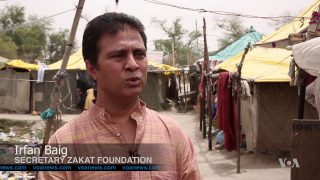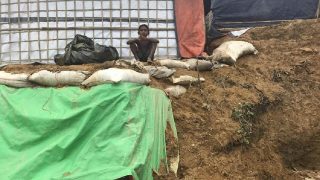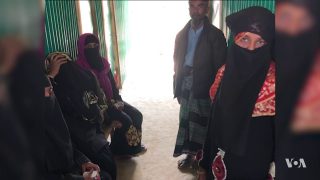
A ruling by the International Criminal Court that it has jurisdiction over the alleged crime of deportation of hundreds of thousands of Myanmar’s Rohingya Muslims to Bangladesh during a military crackdown last year drew a swift rebuff on Friday from the Myanmar government, but was praised by rights groups that want to see those responsible for atrocities against the minority group brought to justice.
The ICC’s chief prosecutor in April requested a ruling on whether the international tribunal could exercise jurisdiction over the country for what she called the “alleged deportation” of more than 700,000 Rohingya from northern Rakhine state during a crackdown by security forces that began on Aug. 25, 2017, even though Myanmar is not a party to the Rome Treaty which established the court.
The ICC gave Myanmar a July 27 deadline to submit a written response to the request for a jurisdiction ruling, but the government failed to comply, called the request “meritless,” and said it should be dismissed.
A statement by President Win Myint’s office expressed regret over the majority decision announced on Thursday by the ICC’s pre-trial chamber and repeated its stance that it has no obligation to adhere to it.
“Myanmar absolutely rejects the decision which is the result of faulty procedure and is of dubious legal merit,” the statement said.
The government again denied the allegation of deportation, adding that it has signed bilateral agreements with the Bangladeshi government to repatriate those who were displaced, and cited its creation of the Advisory Commission on Rakhine state, headed by former United Nations chief Kofi Annan, to make recommendations for forging peace, stability, and development in Rakhine.
Earlier at a brief news conference in Naypyidaw, government spokesman Zaw Htay said Myanmar had laid out its position on the matter in an official statement on Aug. 9
“The ICC’s decision said it can rule on Myanmar, but didn’t cite any evidence,” he said. “To rule on Myanmar, prosecutors must submit evidence at the ICC, and the ICC has to investigate. This step has not taken place yet.”
On Aug. 27, however, the Independent International Fact-Finding Mission on Myanmar, working under a mandate from the U.N.-backed Human Rights Council, said the evidence it weighed showed that Myanmar military leaders should be referred to the ICC, for abuses that “undoubtedly amount to the gravest crimes under international law.”
Bangladesh’s Foreign Secretary Shahidul Haque welcomed the ICC’s decision, adding that the court had sought the country’s assistance in determining whether it had jurisdiction over the issue.
“What I can say is that the ICC has ruled in line with what our submission says,” he told BenarNews, an RFA-affiliated online news service.
Bangladesh hosts approximately 1.1 million Rohingya refugees from the August 2017 crackdown, from a smaller scale campaign in October 2016, and from previous bouts of violence in Rakhine.
Mixed reactions
Rights groups, lawmakers, and politicians in Myanmar had mixed reactions to the news.
Human rights lawyer Thein Than Oo said the government should not be concerned about an investigation by the ICC if it’s not guilty of committing atrocities against the Rohingya.
“If Myanmar didn’t commit any crime, such as genocide or ethnic cleansing, what does it have to be afraid of? Just let the ICC investigate. If it does, Myanmar will regain the dignity that it has lost.”
Thein Tun Oo, spokesman for the opposition Union Solidarity and Development Party (USDP), a military-linked party, said the government should not be silent on the matter.
“It has to speak out by standing by the military when the ICC says it can issue a ruling on Myanmar,” he said. “We are worried about having problems because of the government’s silence and the ICC’s speedy steps to prosecute Myanmar.”
Lawyer Aung Thein said that if the ICC prosecutes Myanmar, it will do so according to its own procedures.
“That means that the ICC will not consider whether the Myanmar government is working on the issue by ignoring international pressure because it wants reconciliation with the military,” he said.
Political analyst Than Soe Naing noted that State Counselor Aung San Suu Kyi, who has faced scathing international criticism for defending the military’s actions in Rakhine, stands with the armed forces on many issues because she wants national reconciliation.
“This is the time for the government and the military to talk openly about the differences between them about their stance on national reconciliation to protect the nation’s sovereignty,” he said.
Than Soe Naing also downplayed reports and a large body of evidence that soldiers had carried out indiscriminate killings, torture, rape, and arson in Rohingya communities during the crackdown.
In late August, investigators from the U.N.’s human rights body issued a report in which they said Myanmar military leaders should be prosecuted for genocide against the Rohingya and identified six officials that it said were responsible for crimes targeting the ethnic minority.
“There might have been some violence [by the military], but I believe it was not genocide or ethnic cleansing,” Than Soe Naing said.
Pe Than, a lawmaker from the Arakan National Party (ANP), which represents the interests of ethnic Rakhines in Rakhine state, warned that the ICC’s prosecution of top military officials identified as responsible for the crackdown could damage Myanmar’s peace process to end decades of civil war in the country.
“The government’s peace process and its efforts to solve the Bengali problem would become disadvantageous, and we are worried about that,” he said, using a derogatory term to refer to the Rohingya, whom Myanmar considers illegal immigrants from Bangladesh, though many have lived in the country for generations
“We don’t want that,” Pe Than said. “That’s why we support the current government’s stance [on this issue], which hurts nobody. If the ICC takes strong actions against Myanmar, we could have internal and external conflicts.”
Military ‘can be prosecuted’
Sai Late, spokesman of the Shan Nationalities League for Democracy (SNLD) party, which campaigns for the interests of the ethnic Shan people, agreed with the ICC’s determination that Myanmar can be prosecuted even though it’s not a signatory of the Rome Statute.
“It can be prosecuted if its actions have affected another country,” he said, referring to Bangladesh.
“If the ICC can submit concrete evidence that shows that the actions of Myanmar’s military affected another country, then military leaders can definitely be prosecuted,” he said. “If this occurs, then Myanmar could face a general crisis.”
“If we encounter conflicts, we don’t know whether the government and the military will work together to solve them or try to leave each other in the lurch,” Sai Late said.
Khun Ja, a leader of the Kachin Peace Network said he approved the ICC’s decision.
“If the ICC can investigate human rights violations by Myanmar’s military, then I welcome it because the military has been committing many crimes for generations,” he said. “Though lower-ranking soldiers have been punished, top generals who ordered the crimes are still free.”
“Whether or not the ICC is successful with its prosecution, there is a good chance for the country to have better military and government by doing this,” he said.
Last month’s findings by the U.N.’s human rights fact-finding mission included Myanmar army atrocities in Shan and Kachin states, where fighting has gone on for decades.
Mohammad Khaled, a Rohingya leader at the Balukhali refugee camp in southeast Bangladesh, demanded that the alleged perpetrators of atrocities against the Rohingya in Rakhine be brought before the ICC.
“The Myanmar government cannot ensure justice for us,” he told BenarNews. “The military must be tried for the crimes. We welcome the ICC [ruling] and eagerly wait to see their trial through the ICC.”
The first steps towards justice
The ICC’s ruling prompted international rights organizations to renew their calls for the prosecution of military officers responsible for ordering and overseeing the violence.
“Myanmar military officers who think they are above the law may finally face consequences for their criminal acts,” said Param-Preet Singh, associate international justice director at Human Rights Watch, in a statement issued Thursday.
“The U.N. Security Council should now refer the whole situation in Myanmar to the ICC so that all victims of atrocities, including those in Kachin and Shan states, get their day in court,” she said, referring to the Myanmar military’s abuse of ethnic minority groups in other states where the national armed forces are involved in hostilities against ethnic armies.
Abdul Malik Mujahid, chairman of the Chicago-based Burma Task Force, welcomed the ICC’s decision.
“In all my meetings with the Rohingya survivors of genocide, the first thing they ask for is justice,” he said in a statement issued Thursday. “Today, I believe, the world has taken the first steps towards a long process of bringing justice to the Rohingya people.”
On Friday, Matthew Smith, chief executive officer of the Southeast Asia-based Fortify Rights, called the court’s decision “monumental,” but a “first step.”
The NGO issued an extensive report in July detailing how Myanmar authorities made “extensive and systematic” plans for attacks on Rohingya civilians in Rakhine state months before Muslim militants carried out the deadly assaults on police outposts in August 2017 which triggered the crackdown.
“This decision should inspire more international action, not less,” he said in a statement. “An ICC referral from the Security Council now would enable the court to investigate the full spectrum of atrocities against Rohingya, Kachin, Shan, and others.”
Nine members of the 15-member U.N. Security Council would need to vote in favor of a resolution to refer the situation to the ICC, but any of the five permanent members — the U.S., the United Kingdom, China, Russia, or France — could veto the move.
‘A milestone decision’
Biraj Patnaik, Amnesty International’s South Asia director, called the decision “a significant step in the right direction which opens up a clear avenue of justice for the Rohingya who were driven out of their homes, often as soldiers opened fire on them and burned down their villages.”
“The court has sent a clear signal to the Myanmar military that they will be held accountable,” he said in a statement released Friday.
Charles Santiago, chairman of the ASEAN Parliamentarians for Human Rights and a member of Malaysia’s parliament, said: “The is a milestone decision and a step forward towards accountability for the alleged atrocity crimes against the Rohingya population.”
“[I]t remains imperative that we continue to seek other international justice mechanisms, as well as the United Nations Security Council referral of Myanmar to the ICC for the wide array of atrocity crimes its leaders have been accused, including genocide and other crimes against humanity,” he said in a statement issued Friday.
“That doesn’t mean that the international community can take our collective foot off the pedal,” he said.
On Monday, Myanmar came under additional fire after two Reuters reporters in the country were sentenced to seven years in prison on what many say are trumped-up charges of violating the country’s Official Secrets Act for reporting on a massacre of 10 Rohingya in a village in Rakhine.
Reporters Without Borders (RSF) took Nobel Peace Prize laureate Aung Sang Suu Kyi to task in a statement on Thursday for remaining silent following its call for her to use her moral authority to ensure that journalists are free to do their jobs in Myanmar without fear of arrest.
“But nothing, absolutely nothing, forces you as the Union of Myanmar’s head of government, to observe this deafening silence,” wrote RSF Secretary-General Christophe Deloire.
“Nothing forces you to refer to journalists’ coverage of Rakhine state as ‘a huge iceberg of misinformation,’” he continued. “Nothing forces you to go down in history as someone who betrayed the ideals on which she built her reputation.”
Reported by Thiha Tun, Wai Mar Tun, and Khin Khin Ei for RFA’s Myanmar Service. Translated by Khet Mar. Written in English by Roseanne Gerin.
Source: Copyright © 1998-2016, RFA. Used with the permission of Radio Free Asia, 2025 M St. NW, Suite 300, Washington DC 20036. https://www.rfa.org.



